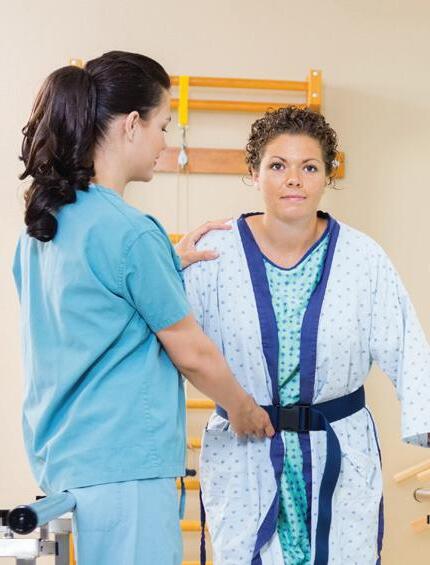
3 minute read
Relax. Recover. Regain. The USDOJ Continues to Increase Its Fraud Enforcement Actions Related To
COVID-19 Relief Benefits,


also agreed to fully repay their loans as part of the settlements.
As is evident from enforcement actions in other industries, COVID-19 FCA enforcement actions are now another theory of recovery against health care companies and individuals. As with other theories of FCA recovery, health care companies must remain vigilant to maintain their compliance with local and federal rules and regulations, and ensure
Let our luxurious surroundings soften your road to recovery

The resort-like amenities at Aspire will create a soothing environment for your rehab stay. Our licensed physical therapists will work with you personally to restore your strength and ability.


Our facility boasts the latest in rehabilitation options, including two state-of-the-art gyms with specialized equipment to get you back in action. Our ceiling-mounted Zero Gravity System suspends patients for secure guidance to get you on your feet faster. Our therapists utilize the latest Omni Virtual Reality System to stimulate progressive therapy through walking, jogging, and other movements. We also have recovery services for hip and knee replacements, plus strength and conditioning programs following rheumatologic conditions.
continued from page 11 they actively follow an effective compliance program. This involves proactively identifying and mitigating risks including reviewing COVID-19 initial loan applications, benefits they may have received and any loan forgiveness applications.
Jim Hoover is a health care trial and compliance Partner at Burr & Forman LLP practicing exclusively in the firm’s health care group. Jim may be reached by telephone at (205) 458-5111 or by E-mail at jhoover@burr.com.
Physician-driven, Patient-centered Kidney Care,

continued from page 12
It is an exciting time in nephrology as a result of these care delivery innovations. Our programs began for a small number of patients on January 1, and we hope to increase those numbers dramatically over the next several years. I feel certain that our efforts will yield happier and healthier lives for our patients, and I can’t wait to see to see the results.
Thomas Watson, MD practices with Nephrology Associates. He is Board-Certified in Nephrology and Internal Medicine by the American Board of Internal Medicine.
DEA Proposes New Telehealth Prescribing Rules,
continued from page 13 increase access to buprenorphine and lower the risk of death.
Misuse of buprenorphine can also lead to death, however. The Act allows prescribing of controlled substances through the internet for legitimate medical conditions even without an in-person evaluation as long as the drugs have been approved for maintenance or withdrawal management treatment of OUD and the telemedicine practitioner can conduct a bona fide patient evaluation. Buprenorphine is currently the only Schedule III-V narcotic that is FDA-approved for use in continuous medical treatment or detoxification for patients with OUD. The rule would allow prescribing through audioonly encounters if the patient is unable to or does not wish to use audio/video technology. The proposed rules contain guardrails against diversion, however, including a requirement that practitioners review and consider Prescription Drug Monitoring Program (PDMP) data prior to prescribing buprenorphine so that a patient engaging in drug-seeking behavior does not receive multiple prescriptions. Additionally, patients would either have to be examined in person by the prescriber within 30 days, or the prescriber would have to examine the patient remotely while the patient is in the physical presence of another DEA-registered practitioner participating in a synchronous audio-video telemedicine encounter with the prescriber.
Other key provisions in the proposed rules include the following:
• This rule would not affect prescriptions of drugs that are not controlled substances.
• The prescriptions would also have to be consistent with state law.
• Practitioners would have to keep records of all qualifying telemedicine referrals, and such records would need to be kept at the registered location that is listed on the prescriber’s certificate of registration.
• Prescriptions stemming from telemedicine encounters could be only for the purpose of maintenance or detoxification.
Although the proposed rules offer a reprieve to the potential abrupt end to telehealth prescribing of controlled substances, many industry stakeholders, including the American Telemedicine Association, have expressed concern that they are more restrictive than necessary to address the DEA’s concerns regarding potentially harmful and abusive prescribing practices while dealing with an opioid epidemic. If the proposed rules are not changed, only time will tell whether they have a positive or negative impact on patient care, including patients struggling with OUD. Importantly, however, state law largely governs remote prescribing and should not be overlooked when evaluating telemedicine requirements.
Shannon Britton Hartsfield and Nili Yolin, who practice in Florida and New York, respectively, are partners at Holland & Knight LLP, where they advise healthcare providers on compliance issues involving federal and state healthcare laws and regulations.









